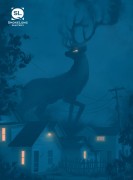Though you never blatantly state it, a whale lurks at the heart of this story. And it got me to thinking, what is it about this mammal that makes it so perfect for metaphor? What drew you to the image of a beached whale?
This story was inspired by at least three whale-related media items:
- I can’t find the article now, but I’d read about a group of beached whales that had been found with tons of plastic and garbage in their stomachs but were still somehow underweight.
- About a year after moving Portland, I’d learned about the exploding whale incident on the coast of Oregon in 1970.
- I stumbled on a video illustrating whale fall, which is when a whale dies at sea, decomposes, and essentially turns into this thriving, localized ecosystem.
I think I was drawn to whales as these beautiful, grand creatures—the fact that they’re the largest mammals on the planet that are also so incredibly vulnerable that they can ultimately be used and broken down.
This story keeps doubling back on the notion of hunger and consumption. The town has a hunger, the creature has a hunger, the main character and their wife hunger. And in this story hunger does not lead to fulfillment. How soon in the process of writing “Whale Fall” did you settle on this notion of hunger leading to blight?
This question makes me realize that food and hunger tend to be pretty common in a lot of my stories (I’m a Taurus). Anyway, I guess I landed on that idea pretty early on. I think of hunger as the most basic form of want and desire, of “not having enough” in the most physiological, inescapable sense.
Hunger or desire of any kind can be hard to fulfill. No matter how much you eat, as full as you get, your body will break all that food down, and you’ll be hungry again within a few hours. It’s a cycle with ebbs and flows.
I was very pleasantly surprised by the passage at the heart of the story where the narrator describes listing things. It makes me wonder about motivation: if the listing is an attempt to prepare for forgetfulness to come or if it’s something else, something darker. You’re able to create the feeling of mystery in a passage about clarifying things and chronicling them. Why do you think you landed on this passage as you wrote the story? Do you feel an act of articulation only creates more mystery?
As a writer, I think that the worst way to show that a character is in love is for them to say, “I love you,” but anyway!
Like you said, that list is a way for the narrator to prepare for the potential forgetfulness and remember the good times, but it’s also them trying to draw a portrait of this person that they fell in love with and trying to figure out where it might have gone wrong. That does kind of create more mystery. Because it’s sort of a futile act, right? Once, my friend asked me why I liked the color blue, and I got increasingly more frustrated because, as much as I can try to articulate it, it really just comes down to “Because I do.” Maggie Nelson wrote an entire book about it!
In the same way, as much as the narrator is trying to define love or give substance to it, they’re really just listing out moments and little details about their wife. Those moments and details clearly matter, but it’ll always be incomplete, biased, insubstantial. There isn’t always a clear answer to why. Sometimes people fall in love, and sometimes people just fall out of love. Trying to articulate it only really builds more questions. I guess that’s the mystery of it.
If Ahab, Jonah, Pinocchio, and Tom Waits walked into a bar, which of them would tell the story of this whale and why?
Oh, man, I’ll say Pinocchio, just because I can absolutely imagine a puppet boy piled with the trash and metal that the whale swallowed, but hearing Tom Waits sing about starving in the belly of this whale in his raspy voice would be pretty great.
How soon in the process of writing did you realize how the story would end? For you as a writer, what does the ending mean?
Endings are still an enigma to me. Sometimes I get the ending and work backwards. Other times I can get to it naturally. And then there are stories like this one where the ending is an ordeal. I mean, I’m sure I had a draft where the narrator and She both succumb to the amnesia but meet each other and fall in love all over again, but that ending feels really empty and invalidates Her feelings and experiences in an awful way. I just wanted to end in a way that felt right to the story and the characters, which maybe isn’t saying much considering everyone in that world still has to deal with the hunger.



 The core workshop of SmokeLong Fitness is all in writing, so you can take part from anywhere at anytime. We are excited about creating a supportive, consistent and structured environment for flash writers to work on their craft in a community. We are thrilled and proud to say that our workshop participants have won, placed, or been listed in every major flash competition. Community works.
The core workshop of SmokeLong Fitness is all in writing, so you can take part from anywhere at anytime. We are excited about creating a supportive, consistent and structured environment for flash writers to work on their craft in a community. We are thrilled and proud to say that our workshop participants have won, placed, or been listed in every major flash competition. Community works.